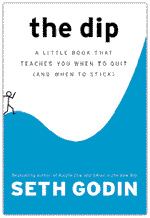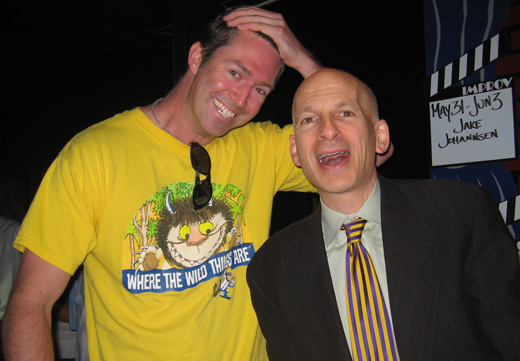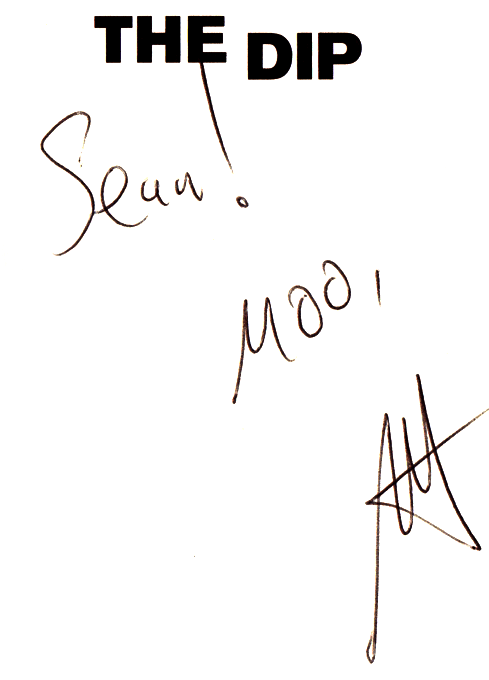 In every good sense of the word that is: he’s quit all the right things. I had the opportunity to see him speak in front of a group of about 300 this morning at the Tempe Improv in Arizona. His talk was themed around his latest book the dip and dealt with the subject of when it makes sense to quit. My friend Francine wrote up a great summary of the content of his talk this morning and Guy Kawasaki covered the book well in his interview with Seth. So rather than rehash either of those, in “purple cow” style, I’m going to cover what I believe was remarkable about both.
In every good sense of the word that is: he’s quit all the right things. I had the opportunity to see him speak in front of a group of about 300 this morning at the Tempe Improv in Arizona. His talk was themed around his latest book the dip and dealt with the subject of when it makes sense to quit. My friend Francine wrote up a great summary of the content of his talk this morning and Guy Kawasaki covered the book well in his interview with Seth. So rather than rehash either of those, in “purple cow” style, I’m going to cover what I believe was remarkable about both.
I finished reading the dip just now. At 75pgs and big print it took less time read it than to hear the talk he gave this morning. His talk was essentially a multimedia version of the book with a focus on anecdotes that make the message more memorable. Seth is a marketing wizard and everything he does draws upon the basic marketing pillars he espouses in Purple Cow. The $50 price tag for this morning’s talk was actually positioned as a mandatory 5-book buy and a free pep talk, which is genius because he knows people will give away the books and “sneeze” his message to others. The books themselves contain a “guest book” registry at the back and encourage the reader to pass it along once finished.
Screw the long tail
Seth takes the heretical position that we don’t quit enough. That’s right. We stick it out too often in a mediocre situation content with average performance in an average arena rather than achieving “rockstar status” in a smaller, more-differentiated arena. His argument is that in a society where we are flooded with choices and different options along with the ability to quickly research and connect with the winner, why would anyone choose 2nd (let alone 15th) place? While the “long tail” produces huge profits for companies like Amazon and Netflix across many selections, individuals represents only one of those selections and therefore should strive to be the juicy #1 in a long-tail-type situation. The relationship between #1, #2, #3, etc is non-linear because the “winners win big because markets love a winner” effect.
Everything you learned in school is wrong
This was a powerful and jarring statement but he is right: the academic system (in America at least) encourages the wrong thing: mediocrity. Which report card do parents and teachers reward more, the kid with an A-, B+, B+, B, B or the kid with an A+ and all C’s? And yet how as a consumer do you choose your physician or auto mechanic or decorator- do you care what grades they got in the other classes? I asked him the question “assuming that you can’t effect policy changes in the broken school system, what can a teacher do now to improve things and impress the dip thinking on kids?” He responded with a personal story about seeing a 6th grader sing “somewhere over the rainbow” for the first time in front of an audience of 400 parents and how that one experience galvanized that child to become a different individual growing up from that point, to seek out that “rockstar” level of heightened experience in everything she did thereafter.
Be the best in the world
The critical thing is how you define “the world.” He advocates being the best in your customers’ world. Depending on what you’re doing, the parameters of that world may mean “the best organic supermarket in a five block radius of Manhattan.” Whatever that world is, identify a territory that is tenable and worth occupying and then dominate it. The second half of his book is titled “If you’re not going to get to #1, you might as well quit now.” This is a message you would never hear in school or from your parents but given the premise of the new economy, I believe he’s right. Obviously this doesn’t apply to hobbies and leisure activities- it’s only for the areas that involve pain and sacrifice for the pursuit of a goal.
Applicability to JumpBox
So I’m always looking through the lens of how this applies to our own startup and the things that resonate:
So to summarize: These seminars are great but it’s not what you learn or don’t learn but how it ultimately alters your behavior going forward. Dips are good because they screen the rest of the jokesters from being able to have rockstar status- scarcity creates value and the Dip is to be embraced. Failure is different than quitting. Quitting strategically when you’re in a cul-de-sac instead of a Dip is smart because it frees you up to pursue the avenues worth pursuing. I highly recommend you see Seth speak if you get the chance, he is an inspirational presenter. It was an honor to meet him and get a personalized “moo” shout out from the Purple Cow himself!









Hi Sean!
Great summary!
I am sorry I didn’t meet you in person yesterday – a friend of Francine is a friend of mine! :)
I was proud that so many people from Phoenix showed up.
Here is my take on the day.
http://www.escapefromcubiclenation.com/get_a_life_blog/2007/05/takeaways_from_.html
Hopefully our paths will cross again in the social media/marketing/entrepreneur circles of Phoenix!
All the best,
-Pam
I wrote up
Great picture. I was there, but left my camera at home. :( Oh well, got to meet Seth.
It’s a wonderful book, and it’s an opportunity for me to make a difference in my life, if I have the guts to quit!
Sean, I’m wondering how your take-away squares with this:
http://dondodge.typepad.com/the_next_big_thing/2007/05/why_1_of_search.html
“ComScore released their April 2007 search market share numbers showing that Google increased its market share lead to about 50%. Yahoo has about 27%, Microsoft 10%, AOL 5%, and Ask.com has 5%. That got me thinking. Should AOL and Ask just give up…hopelessly behind with only 5% market share? In a word…NO!
“Each 1% of market share is worth at least $1 Billion in market cap. Google has 50 points of market share and a stock market cap of $150B, or $3 Billion for each 1% of search market share. Other competitors don’t win the same revenues and market multiples, but even at the low end, 1% of market share is worth over $1 Billion.”
One would be hard-pressed to say that AOL should quit because they’re not going to be the best in the search field.
You could say that AOL and Ask are the rock stars for a particular set of users; they’ve identified a niche and rule it. Another view is that they realize that “good enough” wins in certain areas; you can’t possible pre-select the niche, but, luckily, you don’t have to. You simply have to be available and let the niche find you.
And, actually, I do care what grades my doctor got in other classes because I want a generally astute human to treat me, not a specialized fact-machine.
Comparisons to grade school make no sense; encouraging skill specialization in a 7-year old just seems perverse. People really *do* need to have good knowledge of math and history and grammar. This is not encouraging mediocrity; it is encouraging general education and critical thinking skills.
It’s debatable which is worse; all Bs or one A+ and all Cs, but to suggest those are the only choices is a false choice. Same goes for doctors and mechanics.
I’ve read a few books by Godin, and I end up wondering: aside from anecdotes and clever patter, where’s the evidence that what he’s saying is anything more than well, clever patter and anecdotes? Not that his books are without merit, but absent anything more concrete than pithy sayings and large text there is considerable room for skepticism.
I’ve not read The Dip (I’ll wait until the library has it), but from what I gather I think people might also enjoy “Funky Business” : http://www.amazon.com/Funky-Business-Talent-Makes-Capital/dp/0273645919
I’d also suggest people read The Black Swan (http://www.amazon.com/Black-Swan-Impact-Highly-Improbable/dp/1400063515/ref=pd_bbs_sr_1/102-9381796-0388920?ie=UTF8&s=books&qid=1180222521&sr=1-1) but it may be the wrong kind of contrarian for some.
James, all fair questions. I’ll give you my take and who knows if I’m interpreting Seth’s message correctly but here’s what I get from it:
The question is, could AOL divert its resources towards commanding a smaller world. If their search division is still profitable it’s counter to traditional wisdom to kill it because their still making money on it. But Godin cites the wise decision of Jack Welch CEO of GE stepping in and killing off several marginally-profitable divisions to refocus the resources of the company to command a few niches rather than be mediocre at many. Sacraficing $1BN marketshare would be a tough decision to justify to shareholders but according to Godin, the longterm payoff will be there if there’s a better Dip for AOL to conquer.
I agree that liberal arts education is important – being an ace mathematician and not being able to communicate is worthless. I’m not suggesting specialized tradeschools at the grade schooler level- but at substitute to the norm of going to college… yea.
The story about the 6th grader was meant to show the importance of having kids feel the “rockstar†mastery of something even for a moment so they seek to create that heightened experience in those areas where they excel. I believe Seth was saying he witnessed a visible change in that girl once he saw her sing that part in the play and it bled into other areas of her life growing up and had a positive effect.
It’s not debatable which is worse on the report card as far as the two scenarios- the 1 A and all C’s is clearly a worse GPA. What’s interesting is the pattern throughout the founders I’ve read in the “Founders at Work†series- a lot of them did horribly in school. Whether it’s the maverick mentality that it takes to start something manifesting early in their personality or something else, you’d think if the school system was effective there would be a high correlation between getting good grades and success. But there isn’t so something is wrong.
I’ll give you one of my copies of the Dip- no need to wait for the library, I’ve got 5. I don’t think you’ll find any revolutionary ideas in there that you haven’t already considered. With these types of “anecdotal†books it’s more about what it inspires you to do differently. And it’s inspired two different initiatives for me w/ JumpBox. I’ll check out the Black Swan.
Sean
“I’ll give you one of my copies of the Dip- no need to wait for the library”
Sweet. Thanks.
“I’ve got 5. ”
!
Thanks, Sean, for a great post and a summary better than I could have ever written.
James, I have two answers to your criticism about clever patter and anecdotes.
First: the books are supposed to provoke, not answer. Clearly, they haven’t worked on you, but lucky for me, a lot of my readers find that they give them enough of a firestarter that they’re actually willing to go do something about it.
Second: I have a fairly good record, going back to 1994 (eMarketing) of writing books that describe not just worked in the past, but what’s likely to work in the future. If AdWords aren’t permission marketing, then I don’t know what is…
Hey Sean, great writeup and awesome pic! I’m glad to finally have had the opportunity to get to meet you in person at the event.
[…] If you like Seth Godin’s philosophy and the main message of Purple Cow you’ll dig Buzzmarketing. In a world of advertising in which we are deluged with thousands of sound bites and ads competing for our attention, the most successful marketing campaigns are the ones that achieve buzzworthiness and propel themselves beyond the initial transmission via word-of-mouth. Doug Hughes says the key to marketing is giving people a message that’s worthy of talking about. And I couldn’t agree more. Anybody who is able to convince an entire town in Oregon to rename itself to Half.com and literally put a company on the map gets my ear for a day. Here are the key points and takeaways from reading this book. […]
[…] Here are some other pespectives on the event:Â Sean Tierney and Francine […]
[…] Un article intéressant sur The Dip, sur le blog de Sean Tierney, cofondateur de […]